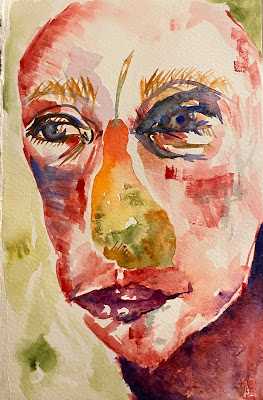Words, images and documents by or collected by Jessica Schouela
Friday, 22 September 2023
Thursday, 21 September 2023
Muriel Rukeyser, Savage Coast
Savage Coast is a posthumously published, largely unedited, coming-of-age autobiographical novel that chronicles Rukeyser's experience as a young reporter traveling to Barcelona at the onset of the Spanish Civil War to cover the The People's Olympiad in protest of the Berlin Olympics in Nazi Germany, 1936.
While my summer in Madrid at the age of 19 was of course nothing like Rukeyser's experience of what it means to be a foreign national in a country at war, confronting questions of neutrality and alignment, political and personal solidarity, the observations and transformation of Helen, Rukeyser's naive but insightful, deep-feeling protagonist, and her amazement while discovering Spain and herself in a country other than her own, was warmly resonant.
The passage in the below image starts with: It was all new and must be important, must be valuable, in the same way that she used to think she must grow to be valuable. It was too much to carry, all this self-consciousness, and it was beginning to relax from her in the heat and adventure here.
It follows:
Wednesday, 20 September 2023
André Brouillet, A Clinical Lesson at the Salpêtrière (1887)
Saturday, 16 September 2023
Celia Pym (Threads exhibition at Arnolfini)
Saturday, 2 September 2023
Isaac Bashevis Singer, The Magician of Lublin
I picked up this novel as I've become interested in learning more about Jewish mysticism, specifically after discovering the dybbuk, a ghost/spirit of a dead person that is typically malicious and haunts the living by possessing them - sometimes it is thought that the dybbuk, male, would seek to possess women sexually on their wedding nights by entering through their vagina, an act that would require exorcism. The dybbuk that haunts Yasha, Singer's protagonist in The Magician of Lublin, is not sexualised, but takes the form of an evil spirit or monster that Yasha has been aware of and feared since childhood, a demonic spectre that creeps up and threatens his wellbeing and safety at regular intervals.
The more I read the novel, the more I liked it and came to appreciate Singer's project - Yasha, who is half-Jewish and half Gentile is a magician from Lublin who travels across Poland, performing and gaining small celebrity status, though none equal to what he could accomplish if he were working in Western Europe. He has several mistresses in different cities and continuously contemplates leaving his wife Esther—a seamstress who keeps a Jewish home in Lublin and whom he only sees on the holidays when he returns—as well as each of his mistresses, wavering between total abandonment and radical commitment which would mean swearing off his wife and other lovers and in the case of Emilia, a Catholic, his Jewish faith.
The Magician of Lublin reminded me of Dostoyevsky's Crime and Punishment as well as Camus's L'Étranger - the catalyst for Yasha's existential rumination swelling to spiritual crisis is a failed robbery of an innocent man. His impotence to pick the lock that would have yielded his treasure when lock picking had been one of his most revered tricks (indeed he does so hubristically with blindfolds in the first half of the book), causes him to reconsider what he thought he knew of himself and severely injuring his foot from falling from a window, renders him disabled, unable to go through with the (impossible, suicidal) tightrope performance, which he had been due to enact that week. One might even be tempted to think the robbery an unconscious act of self-preservation.
Yasha, who is easily distracted and very impressionable, oscillates between extreme positions that he feels with such conviction in any given moment depending on the setting (Do I leave Esther? Magda? Emilia? Does religion mean anything? Am I a Jew, like those praying men in shawls and with teffilfin in this synagogue in which I too take refuge?), and finds himself confronting his own morality and existence, seeking spiritual signs of good and evil, sin/condemnation, piety/redemption. In the end, his Judaism becomes his salvation but not at the expense of his freedom. Grief and guilt stricken at the pain and death he has caused (Magda, is lover and assistant hangs herself as a result of his infidelity and fear of his abandonment), Yasha builds a tiny brick house behind his house with Esther to spend the rest of his days in prayer and shielded from the world to ensure he does not act on his temptations and has a small chance of obtaining Godly forgiveness. And yet, this physical isolation is not hermetically sealed solution - the townspeople of Lublin come to believe that he is a healer and saviour and visit him, pleading with him through a tiny window, with requests for blessings, such that he cannot live in total disconnection and humility, and without the projection and needs of others. His new fame results in journalistic coverage and reaching Emilia in Warsaw, the novel concludes with a most human letter from her on shared responsibility and alternatives to forgiveness and continuing to truly live after sin and with love.

















